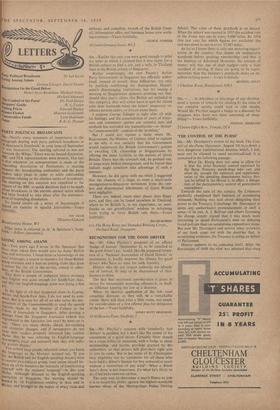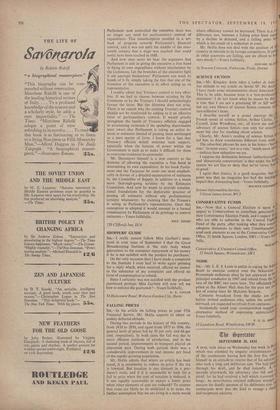'THE CONTROL OF THE PURSE' SIR,—Mr. Davenport's review of my
book The Con- trol of the Purse (Spectator, August 14) lays down a very dangerous constitutional doctrine which, I feel, must not be allowed to stand uncontradicted. It is contained in the following passage : What Dr. Einzig does not seem to allow for is that the strict financial control exercised by the fierce Treasury watch-dogs who can, and often do, mangle the estimates and supplemen- taries of the spending departments before they can be tabled in the House is, in effect, a delega- tion of the parliamentary control of government expenditure.
Towards the turn of the century the Commons gradually abandoned their function of scrutinising estimates. Nothing was said about delegating their power to the Treasury. I challenge Mr. Davenport to quote any authoritative pronouncement in such a sense--if he can. A. J. Balfour and others favouring the change simply argued that it was much more interesting to spend Parliament's time on debating broad policies than on scrutinising expenditure items. But now Mr. Davenport and several other reviewers of my book came out with the doctrine that, in scrutinising estimates, the Treasury is acting on behalf of Parliament.
History appears to be .repeating itself. After the Revolution of 1688 the view was adopted that since
Parliament now controlled the executive there was no longer any need for parliamentary control of expenditure. This misconception resulted in a set- back of progress towards Parliament's financial control, and it was not until the middle of the nine- teenth century that a stage was reached that could easily have been reached in 1688.
And now once more we hear the argument that Parliament is safe in giving the executive a free hand in fixing its own expenditure without interference by the Commons. Let the branches of the executive fight it out amongst themselves! Parliament can wash its hands of it by simply taking the line that one of the branches of the executive is in effect acting as its representative.
I readily admit that Treasury control is very effec- tive. If we had to choose between scrutiny by the Commons or by the Treasury I should unhesitatingly favour the latter. But the dilemma does not arise. There is no reason why the existing Treasury control should not be reinforced by adding to it an effective form of parliamentary control. It would greatly strengthen the hands of Treasury offidials engaged in scrutinising estimates if the spending departments were aware that Parliament is taking an active in- terest in estimates instead of passing them unchanged as a pure matter of form. I know for a fact that Treasury officials would welcome such support, especially when the balance of power within the Government is such as to make it difficult for them to overcome resistance to economies.
Mr. Davenport himself is a new convert to the doctrine of allowing the executive a free hand in determining its own expenditure. In his book Parlia- ment and the Taxpayer he came out most emphati- cally in favour of a detailed examination of estimates by the Committee of Supply, in addition to a much more thorough-going scrutiny by the Estimates Committee. And now he wants to provide constitu- tional foundations for the deplorable practice of passing all estimates without any parliamentary scrutiny whatsoever, by claiming that the Treasury is acting as Parliament's representative. Once this conception is adopted it would amount to a formal renunciation by Parliament of its privilege to control estimates.—Yours faithfully,
PAUL EINZIO 120 Cliffords Inn, EC4











































 Previous page
Previous page